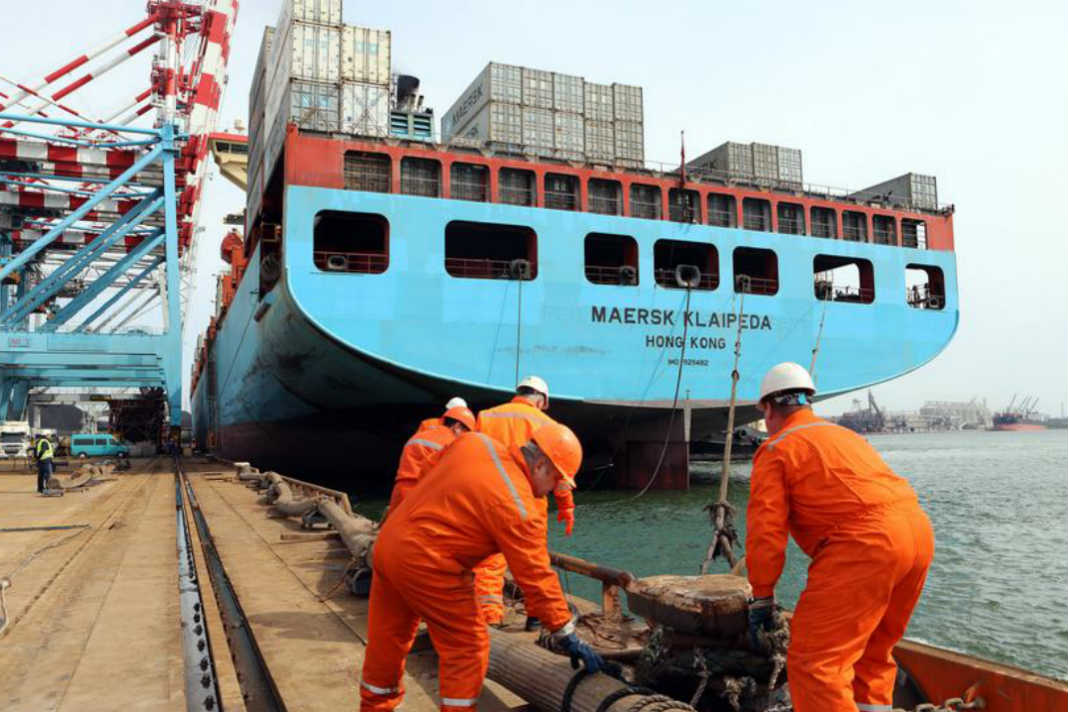The international shipping industry warned of a global trade crisis with up to 400,000 crew stranded either at sea or at home due to the pandemic.
Guy Platten, secretary-general of the International Chamber of Shipping, described the situation as a "ticking time-bomb" that poses risks to the supply chain.
According to the United Nations Conference on Trade and Development, around 80 percent of world trade by volume is carried on ships, ranging from container ships to dry bulk carriers.
However, operations are being hindered by travel restrictions, preventing crews from disembarking or from traveling to a port where ships are waiting for crew changes.
Seafarers are also having difficulties obtaining entry or exit visas, compounded by the suspension of commercial flights that would bring the crew to and from their ships.
Those affected make up over a fifth of the seafarers who navigate 96,000 commercial vessels.
Governments have also been slow to implement the International Maritime Organisation's 12-step protocol for safe crew changes, leaving the crew stranded at sea increasing weekly, Platten noted.
The shipping industry is calling on governments to create "safe corridors" such as designating seafarers as "key workers" to allow them to travel without restrictions in joining or leaving a vessel and creating safe areas in airports for their transit.
Rajesh Unni, chief executive of Singapore-based ship manager Synergy Marine Group, noted that while some governments such as the Netherlands have taken action, they were "too little and too slow" to ensure the continuity of supply-chain,
He added that the welfare of seamen should not be ignored.
Henriette Hallberg Thygesen, fleet and strategic brands chief of Maersk, the world's largest container ship operator, noted of the urgent need to put up safe corridors between key sources of seafarers such as the Philippines and India and crew change hubs around the world.



 Dow Hits 50,000 as U.S. Stocks Stage Strong Rebound Amid AI Volatility
Dow Hits 50,000 as U.S. Stocks Stage Strong Rebound Amid AI Volatility  Trump Endorses Japan’s Sanae Takaichi Ahead of Crucial Election Amid Market and China Tensions
Trump Endorses Japan’s Sanae Takaichi Ahead of Crucial Election Amid Market and China Tensions  Dollar Near Two-Week High as Stock Rout, AI Concerns and Global Events Drive Market Volatility
Dollar Near Two-Week High as Stock Rout, AI Concerns and Global Events Drive Market Volatility  RBI Holds Repo Rate at 5.25% as India’s Growth Outlook Strengthens After U.S. Trade Deal
RBI Holds Repo Rate at 5.25% as India’s Growth Outlook Strengthens After U.S. Trade Deal  Trump Signs Executive Order Threatening 25% Tariffs on Countries Trading With Iran
Trump Signs Executive Order Threatening 25% Tariffs on Countries Trading With Iran  Trump’s Inflation Claims Clash With Voters’ Cost-of-Living Reality
Trump’s Inflation Claims Clash With Voters’ Cost-of-Living Reality  South Africa Eyes ECB Repo Lines as Inflation Eases and Rate Cuts Loom
South Africa Eyes ECB Repo Lines as Inflation Eases and Rate Cuts Loom  India–U.S. Interim Trade Pact Cuts Auto Tariffs but Leaves Tesla Out
India–U.S. Interim Trade Pact Cuts Auto Tariffs but Leaves Tesla Out  Japan Economy Poised for Q4 2025 Growth as Investment and Consumption Hold Firm
Japan Economy Poised for Q4 2025 Growth as Investment and Consumption Hold Firm  Gold Prices Slide Below $5,000 as Strong Dollar and Central Bank Outlook Weigh on Metals
Gold Prices Slide Below $5,000 as Strong Dollar and Central Bank Outlook Weigh on Metals  China Extends Gold Buying Streak as Reserves Surge Despite Volatile Prices
China Extends Gold Buying Streak as Reserves Surge Despite Volatile Prices  Fed Governor Lisa Cook Warns Inflation Risks Remain as Rates Stay Steady
Fed Governor Lisa Cook Warns Inflation Risks Remain as Rates Stay Steady  Gold and Silver Prices Rebound After Volatile Week Triggered by Fed Nomination
Gold and Silver Prices Rebound After Volatile Week Triggered by Fed Nomination  Silver Prices Plunge in Asian Trade as Dollar Strength Triggers Fresh Precious Metals Sell-Off
Silver Prices Plunge in Asian Trade as Dollar Strength Triggers Fresh Precious Metals Sell-Off  Thailand Inflation Remains Negative for 10th Straight Month in January
Thailand Inflation Remains Negative for 10th Straight Month in January  Asian Stocks Slip as Tech Rout Deepens, Japan Steadies Ahead of Election
Asian Stocks Slip as Tech Rout Deepens, Japan Steadies Ahead of Election  Bank of Japan Signals Readiness for Near-Term Rate Hike as Inflation Nears Target
Bank of Japan Signals Readiness for Near-Term Rate Hike as Inflation Nears Target 































